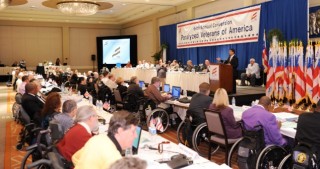
By Felice J. Freyer in the Providence Journal
Providence, Rhode Island— Staff Sgt. Cory Remsburg, an Army Ranger, was on his 10th deployment last fall when a roadside explosive in Afghanistan blew him into a canal and shattered the right side of his head. He was in a coma for three months.
Never giving up, his relatives and caregivers massaged his body, exercised his limbs, talked to him, even released aromas — stimulating all his senses. And eventually, to the doctors’ astonishment, Remsburg, 27, showed signs of consciousness. He is now speaking and making a slow but promising recovery.
President Obama mentioned Remsburg in an address earlier this month to the Disabled Veterans of America.
And Secretary of Veterans Affairs Eric K. Shinseki told Remsburg’s story in greater detail on Thursday to the Paralyzed Veterans of America, who have been holding their 64th annual convention at the Westin Hotel.
“The VA will never give up on him or any other veteran,” Shinseki said.
Remsburg’s experience exemplifies the challenges the VA faces as thousands of veterans, many with brain injuries or missing limbs, stream home from the prolonged conflicts in Iraq and Afghanistan. Now, nearly 70 percent of service people who arrive comatose — patients once considered lost causes — are brought back to consciousness at VA hospitals, Shinseki said.
“This is why we don’t accept ‘hopelessness’ in our lexicon,” he said.
Equally as important to the audience of about 150 veterans, nearly all using wheelchairs, are issues such as the effects of Agent Orange, a defoliant used in Vietnam, and Gulf War syndrome, the symptoms suffered by veterans of the first Gulf War. For veterans, it has been a struggle to prove their symptoms were service-related and thus eligible for treatment at VA hospitals.
Last year, the Department of Veterans Affairs added three new illnesses — Parkinson’s disease, hairy cell leukemia and ischemic heart disease — to the list of diseases that are “presumed” connected to military service for veterans exposed to Agent Orange.
Shinseki, a retired Army general and combat veteran of Vietnam, said that the VA’s $114-billion budget for 2010 is 16 percent greater than the previous year, “the largest single-year increase in over 30 years.” A requested 2011 budget of $125 billion would provide “much-needed firepower” for his priorities: increasing access to benefits and services, clearing up the backlog of disability claims and eliminating homelessness among veterans by 2015.
About 1 in 6 homeless people, or 107,000 Americans, are veterans, Shinseki said, adding that any number of homeless veterans is unacceptable.
In Providence, about 300 veterans are enrolled in a homeless outreach program and clinic at the Providence VA Medical Center, according to Thomas Antonaccio, health systems specialist at the Providence hospital, which treats some 33,000 veterans a year.
Maurice Jordan, deputy executive director of the Paralyzed Veterans of America, said in an interview that Shinseki has addressed his group’s concerns, particularly expediting the claims of Vietnam veterans who had been exposed to Agent Orange. “Because he has been so engaging, we’ve been able to work through issues we’ve had for years,” Jordan said. “We’re very satisfied.”
Although representatives of the Providence VA Medical Center were on hand, and U.S. Sen. Sheldon Whitehousestopped by after the talk, Shinseki’s speech made no mention of VA initiatives in Rhode Island. The Providence regional benefits office is one of four pilot sites developing a way to automate the claims process, Whitehouse said.
Additionally, the VA Center for Restorative and Regenerative Medicine, a collaboration among the Providence VA Medical Center, Brown University and the Massachusetts Institute of Technology, is developing advanced prosthetic limbs, including “bio-hybrids” integrating mechanical devices with living tissue and brain chips that could enable people to move prostheses with their thoughts.
ATTENTION READERS
We See The World From All Sides and Want YOU To Be Fully InformedIn fact, intentional disinformation is a disgraceful scourge in media today. So to assuage any possible errant incorrect information posted herein, we strongly encourage you to seek corroboration from other non-VT sources before forming an educated opinion.
About VT - Policies & Disclosures - Comment Policy



